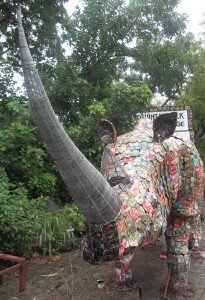What makes us happy
Friday, April 26th, 2013 by Bev ClarkHappiness is love. Full stop.
Read about what makes us happy according to the Grant Study. Via Atlantic
Kubatana.net ~ an online community of Zimbabwean activists
Happiness is love. Full stop.
Read about what makes us happy according to the Grant Study. Via Atlantic
Then our design director, Brian Struble, and deputy design director, Liz Noftle, came up with the concept of taking shoes worn during the marathon and arranging them so that the negative space is in the shape of a heart.
Read more about this inspiring magazine cover here
and I am waiting
for forests and animals
to reclaim the earth as theirs
and I am waiting
for a way to be devised
to destroy all nationalisms
without killing anybody
and I am waiting
for linnets and planets to fall like rain
and I am waiting for lovers and weepers
to lie down together again
in a new rebirth of wonder
Lawrence Ferlinghetti, “I Am Waiting”
The US Embassy Public Affairs Section held a discussion on the problem of waste and the challenges of disposing of it, particularly in urban areas. The discussion, lead by Environment Africa, explored various ways of preventing littering and cleaning up the environment, using the expression “the carrot or the stick” to described how people can either be encouraged to not litter through incentives or through punishment.
An incentive could be offered as is done in Botswana, where people are paid to clean the streets around their area. Or a punishment could be enforced, as is enacted in the Environmental Management Act – Any person found littering should be fined no more than a level 3 fine (about $20). Another suggestion was creating a situation like in Rwanda, where once a month everyone is required to spend a few hours on a designated day, cleaning the area around where they live. While it has encouraged a cleaner environment, it has also helped bring people together after the atrocities of the Genocide 19 years ago through collective acts of community service.
However, all suggestions have their disadvantages, as incentives would be expensive, the fine of no more than $20 could have little impact on people and finding one day where everyone can drop everything and spend a few hours doing community service would be difficult. An ideal situation would be a combination of different approaches, as is suggested by Environment Africa. They bring awareness to the importance of a clean environment and the dangers of pollution, leading campaigns and outreaches to educate communities on the issues.
Environment Africa also has a focus on “Reduce, Reuse, Recycle”, looking towards innovative ways in which waste can be put to use. Several examples were shown; from recycled paper, which was turned into playing cards, and art made out of old cans. There was a strong emphasis on the need for innovation, looking towards young people to find new and creative ways to deal with the increasing build up of waste in both rural and urban areas.
However, the main message was this is our environment, which is everyone’s responsibility. To protect Zimbabwe and all the beauty, we all need to take responsibility and make an effort.

Photo: Environment Africa
You will hear thunder and remember me, and think: she wanted storms.
- Anna Akhmatova
Via http://larmoyante.com/
One question from a bullet
John Agard
I want to give up being a bullet
I’ve been a bullet too long.
I want to be an innocent coin
In the hand of a child
And be squeezed through the slot
Of a chewing gum machine.
I want to give up being a bullet
I’ve been a bullet too long.
I want to be a good luck seed
Doing nothing in somebody’s pocket.
Or some ordinary little stone
On the way to becoming an earring.
Or just lying there unknown
Among a crowd of other ordinary stones.
I want to give up being a bullet
I’ve been a bullet too long.
The question is
Can you give up being a killer?